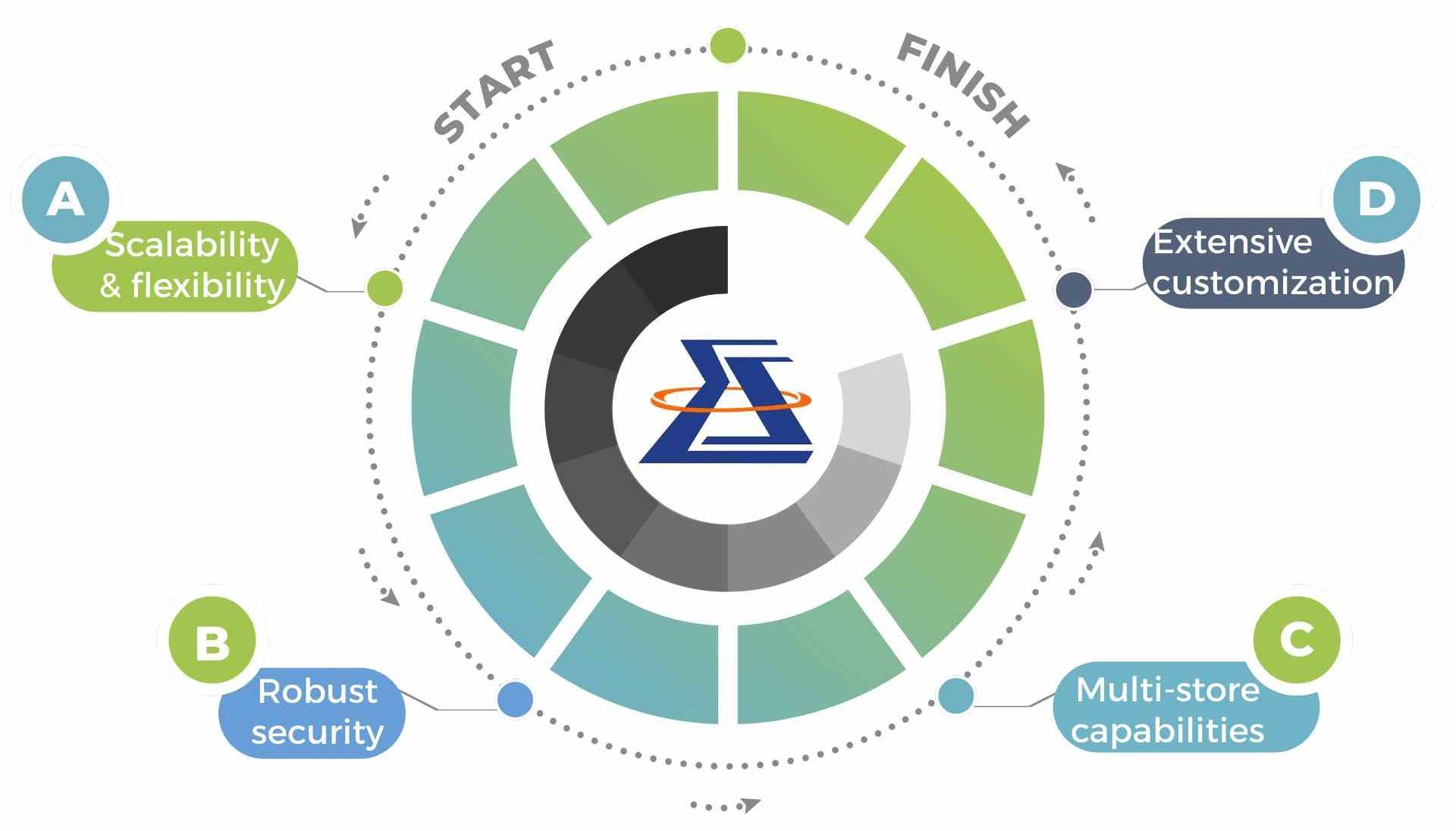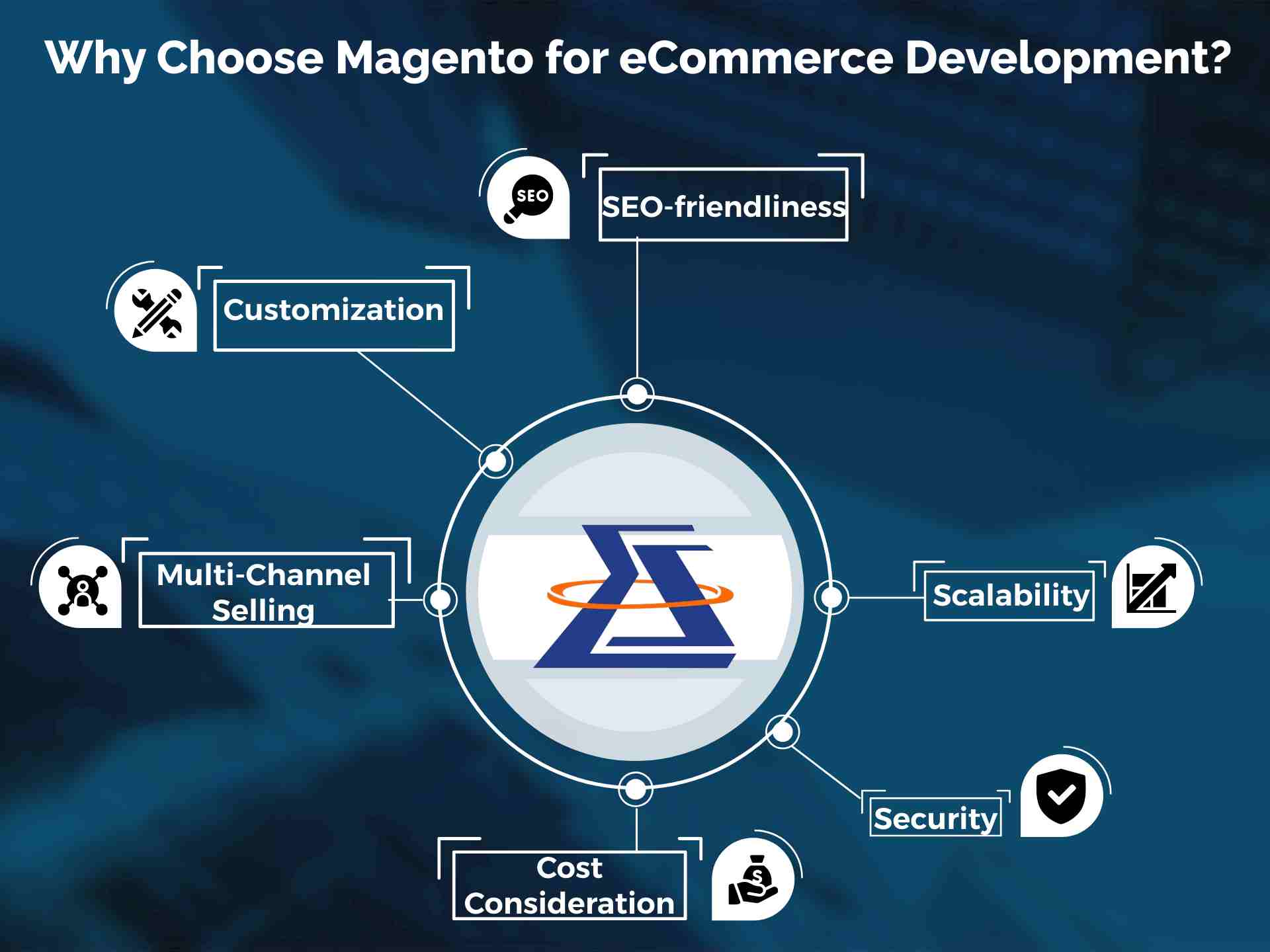Introduction
If you think about the growing number of eCommerce platforms, the data will mesmerize you. Among various reasons, the pandemic and supply chain disruption in the last 5 years have stimulated the growth of online stores. The sales on eCommerce platforms have reached $6.3 trillion in 2024 and are calculated to touch $8.1 trillion by 2026.
This mammoth growth in eCommerce platforms globally has made businesses curious. Businesses are asking apparent questions related to what could be the best platform for ecommerce website development and how much does it cost to develop an ecommerce website.
Through this blog, Sigma Solve explains how a web design and development company in the USA can preferably choose Magento for eCommerce development for scalability, freedom to customize the platform, better search engine optimization, and multichannel selling, thus enhancing the gains for the business of the online shops.
Understanding Magento for eCommerce Development
What is Magento?
When a business determines to go online with an eCommerce solution that can provide customization and scalability along with better use of SEO services, they would prefer Magento eCommerce website development, an open-source platform. Used by over 250,000 eCommerce businesses, Magento is now a part of the Adobe family.
Key Features of Magento for eCommerce Development
Scalability and flexibility
Magento fits most businesses, managing growing traffic and sales without any issues. It has remarkable elasticity for integration with other systems and services as it expands in size.
Extensive customization options
What makes Magento for eCommerce development unique is the flexibility it provides to companies—virtually every element of an online store can be customized. It is rigorous over the design and functionality of the context and offers full power over the interface.
Multi-store capabilities
It is also important to know that Magento comes with flexibility that allows businesses to manage multiple stores with Magento effectively with just a single backend. This feature works well with multiple products, cross-country operations, and niche-market segmentation across two or more brands.
Robust security features
Magento acknowledges safety with frequent upgrades, PCI standards, and additionally easy and highly developed goodies such as two-factor acknowledgment. It protects the customer’s information and makes sure that online transactions are safe.
Why Choose Magento for eCommerce Website Development?
Scalability
Explanation of Scalability
Through its architecture, Magento makes it possible for businesses to effectively accommodate the growing traffic and transactions without the risk of having slow sites. It suits everyone, from small internet start-ups to globally established large-scale corporations.
Examples of Scalable Business
Magento website development companies recommend big brands incorporate Magento into their online stores because Magento delivers the functionality needed by a large eCommerce retailer through various international business locations such as Coca Cola, Ford, Nike, etc., to name but a few.
Customization
Tailored Solutions
What makes Magento so special is that it can be easily tailored to meet specific companies’s needs and provide a unique experience to consumers. They allow everything from customizing the checkout procedures to defining individual product recommendations based on the needs of a certain business.
Available Extensions and Themes
Apart from that, the platform provides access to the world’s largest library of extensions and themes via the Magento Marketplace, so adding or changing features or a storefront design does not require time-consuming custom coding.
SEO-Friendliness
Built-in SEO Features
SEO-friendly eCommerce solutions from Magento feature customizable URLs, XML sitemaps, and management of meta information that increase stores’ rank.
Impact on Visibility
All these SEO features greatly enhance organic traffic, enhancing client accessibility on the internet without having to use paid tools all the time.
Security
Robust Security Measures
Magento offers enhanced protection in every aspect possible: setting up security measures, updating them frequently, being PCI compliant, and also offering safe gateways for money transactions.
Importance of Security in eCommerce
Security features ensure customers can safely make purchases, prevent hacking incidences, and preserve the business image, which are key success factors in today’s competitive eCommerce business environment.
Multi-Channel Selling
Integration with Marketplaces
Magento also has excellent connectivity with other famous platforms such as Amazon and eBay so as to create a new business market and approach potential customers.
Unified Management
In addition, management of stock, orders, and customers in one location for different sales outlets makes operations easier and offers integrated information.
Cost Considerations
Initial Investment vs. Long-term Value:
Despite Magento having higher development costs at the beginning, it provides cost-effective solutions because of being a flexible, feature-rich platform. Companies also reap the advantages of lower future development requirements as well as increased effective use of the applications.
Return on Investment (ROI)
Due to its complexity and flexibility, custom eCommerce website development services offer enhanced sales-to-conversion ratios and gross average order values. They found out that this improved performance can lead to substantial ROI after some time.
Real-world Success Stories
Café Press
Café Press is a retailer of customized gifts and custom products online.
- Sales Growth: When they migrated to Magento, Café Press saw a 30 percent increase in sales in the first year.
- Customer Engagement: Verified customers spent more than 50% additional time on the platform, giving more opportunities for personalized shopping experiences, resulting in higher customer satisfaction scores and a higher repeat purchase rate.
Helly Hansen
Helly Hansen is the world’s top-notch outdoor gear and technical sailing provider.
- Sales Growth: Magento empowered Helly Hansen with superior SEO and customization to improve sales data by 25% on a YOY basis.
- Customer Engagement: But this significantly increased customer engagement metrics, such as a 40% increase in time spent on site, and was attributed to improvements in user experience features like product recommendations and streamlined navigation.
Land Rover
Magento is the chosen eCommerce platform of luxury vehicle manufacturer Land Rover.
- Sales Growth: Magento was also implemented, and the result was a reported increase in eCommerce sales by 20% when running promotional campaigns.
- Customer Engagement: Serving personalized content and targeted marketing to their customers gave Land Rover a 50% bump in campaign email open rates to campaigns driven from their Magento site.
Comparison with Other Platforms
| Platform | Pros | Cons |
|---|---|---|
| Magento |
|
|
| Shopify |
|
|
| WooCommerce |
|
|
| BigCommerce |
|
|
Conclusion
Magento has an edge over other eCommerce platforms in scalability, customization, SEO, security, and multichannel selling. Magento ecommerce website development makes it perfect for growth-oriented companies that require a tough and forgiving environment for their eCommerce project.
Although there are many benefits to using Magento for online store creation, businesses should take the following factors into account: the requirements of a particular business, the costs, and the technical competencies of the business. By talking to a Magento specialist, you can decide whether the platform suits your eCommerce objectives.
FAQs
Being an open-source platform for developing eCommerce solutions, Magento is used by thousands of businesses worldwide. It is famous for the customization of online stores, improving scalability and flexibility, and providing superior SEO services.
Magento is versatile due to the advanced options and multi-stores; as such, it is suitable for large enterprises with needs and huge traffic.
First is Basic, which ranges from $20000 for one website, and second is Construct, which ranges from $100,000+ for big custom constructions. Some of the cons include recurrent costs, which include the cost of its ongoing maintenance, which is relatively expensive.
Yes, Magento is perfect for multi-store management, which means that you can perform management of your brands, regions, B2B, and B2C stores from one backend.
Despite being tied to greater enterprises, Magento is not a bad option for small businesses with growth capability or specificity.
Magento allows even more settings and flexibility in comparison with Shopify, which, in turn, is easier to navigate. It is important to take into consideration the size of the business, the level of technical knowledge that is necessary for the administration of the system, or the characteristics of the business process it wants to support the most.
Certified Magento developers should be preferred; you should go through the developers’ portfolio and feedback of the clients; it’s important to understand that the developer gets your business and its goals.
If you are building an enterprise-level eCommerce platform, Magento beats WordPress hands down due to its advanced features. Nonetheless, WordPress is better for small eCommerce stores, which comes with excellent SEO services and ease of using WordPress.




